As the world continues to grapple with the effects of climate change, the need for sustainable energy sources has never been more pressing. One such source that has gained significant attention in recent years is solar power. At the heart of this renewable energy source are solar generators. These devices harness the power of the sun, converting it into usable electricity for a variety of applications.
Solar generators are versatile, offering a clean, quiet, and renewable source of power that can be used in virtually any location with access to sunlight. From powering homes and businesses to providing emergency backup power during outages, solar generators are an increasingly popular choice for many people around the world.
Unlike traditional generators that run on fossil fuels like gasoline or diesel, solar generators produce no harmful emissions, making them a more environmentally friendly choice. They are also quieter, require less maintenance, and can provide power indefinitely as long as they have access to sunlight.
Our Top Solar Generator Picks
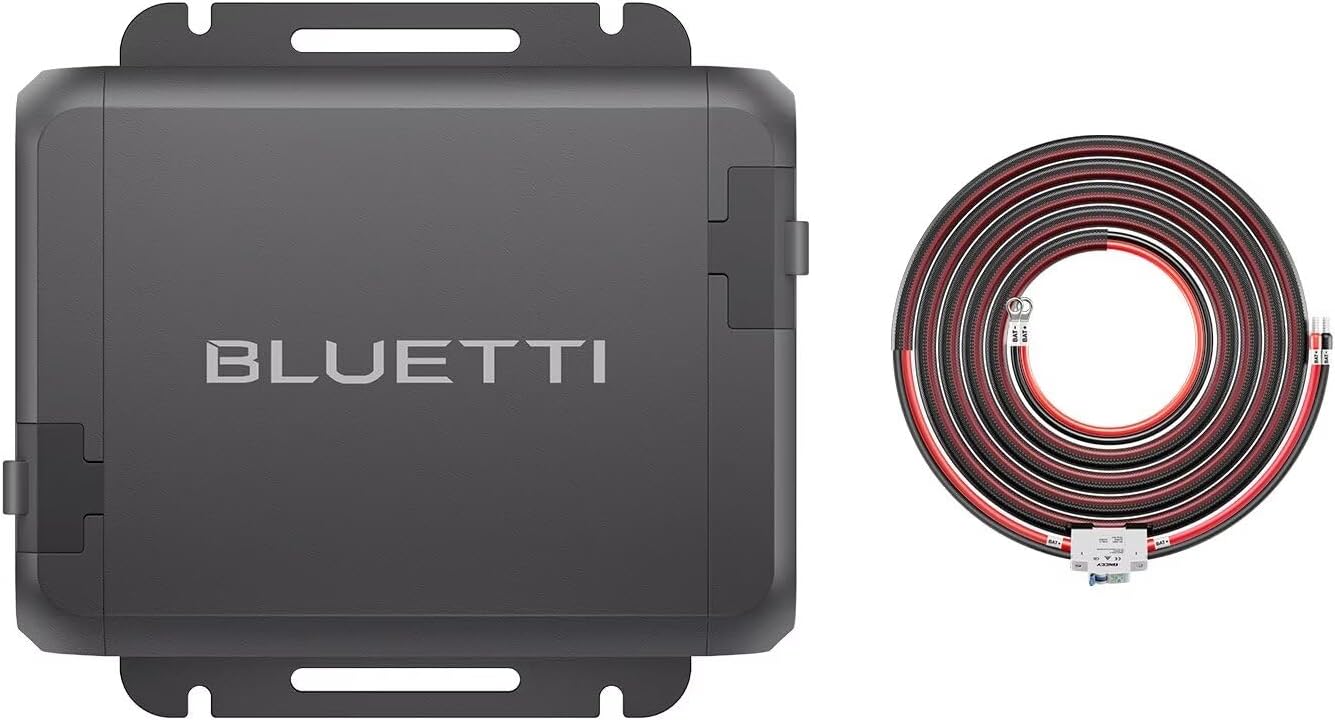
BLUETTI Solar Generator
Check on Amazon
Key Specs
- Wattage: 560 watts
- Compatibility: Works with all BLUETTI models and 95% of third-party power stations
- Input Cable: 6AWG DC
- Color: Black
- Special Feature: Fast charging with active cooling
The BLUETTI Solar Generator is an impressive solution for anyone looking to quickly charge their portable power stations while on the go. It offers 6X faster charging than standard car chargers, making it a game-changer for off-grid adventures. With universal compatibility, it works with all BLUETTI models and 95% of third-party power stations, offering flexibility. The charger uses an intelligent algorithm to ensure battery safety while preventing draining, and its active cooling fan maintains stable performance even in high temperatures.
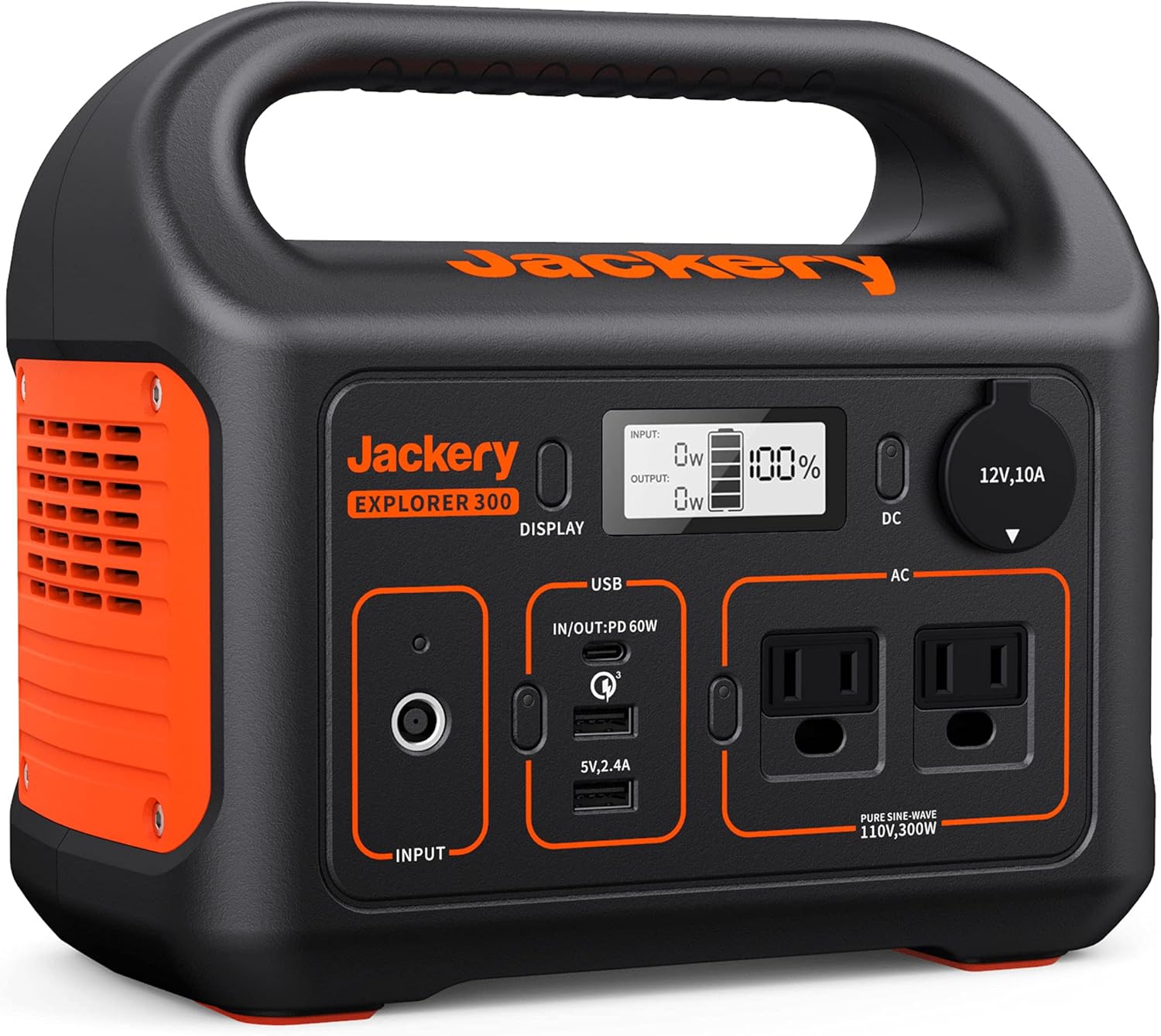
Jackery Solar Generator
Check on Amazon
Key Specs:
- Wattage: 300 watts
- Battery: 293Wh lithium-ion
- Ports: 2 AC outlets, 1 PD 60W USB-C, 1 USB-A, 1 DC car port
- Recharge Time: 80% in 2 hours via wall and PD USB-C
- Weight: 7.1 pounds
The Jackery Solar Generator is a reliable and efficient solution for powering devices while on the go. It offers a 300W power capacity from its 293Wh lithium-ion battery and includes 2 Pure Sine Wave AC outlets for safe and stable power. One of the standout features is its quick rechargeability, with the ability to charge up to 80% in just 2 hours using both wall outlets and the 60W PD USB-C port. This compact generator is ideal for camping, road trips, and emergencies.
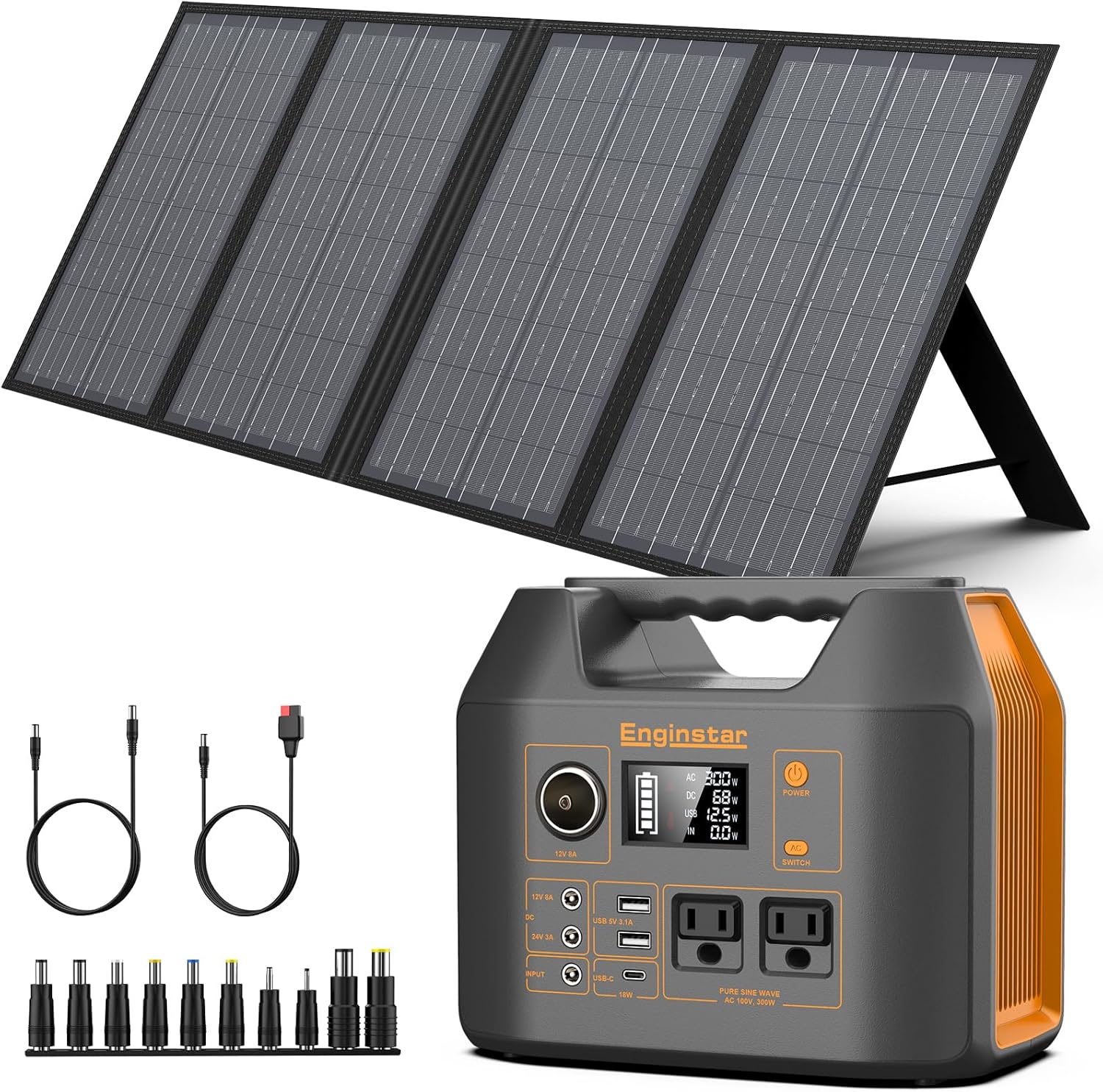
EnginStar Solar Generator
Check on AmazonKey Specs:
- Measuring Range: 0 to 25.4 mm (0 to 1 inch)
- Resolution: 0.01 mm (0.0005 inches)
- Material: Space aluminum, waterproof, dustproof
- Display: Large LCD screen for clear readings
- Functionality: Inch/metric conversion, zero-out capability
The Digital Dial Gauge is a precision tool designed for mechanical and industrial measurements. With a measuring range of 0 to 25.4 mm (0 to 1 inch) and 0.01 mm resolution, it ensures high accuracy for small linear distances. The large LCD screen provides a clear, error-free reading, making it ideal for DIY projects, machine shop work, or car maintenance. Built from space aluminum, it offers excellent wear and impact resistance, and is waterproof and dustproof for reliable performance in tough environments. Inch/metric conversion adds versatility, and you can easily zero out any position during measurement.
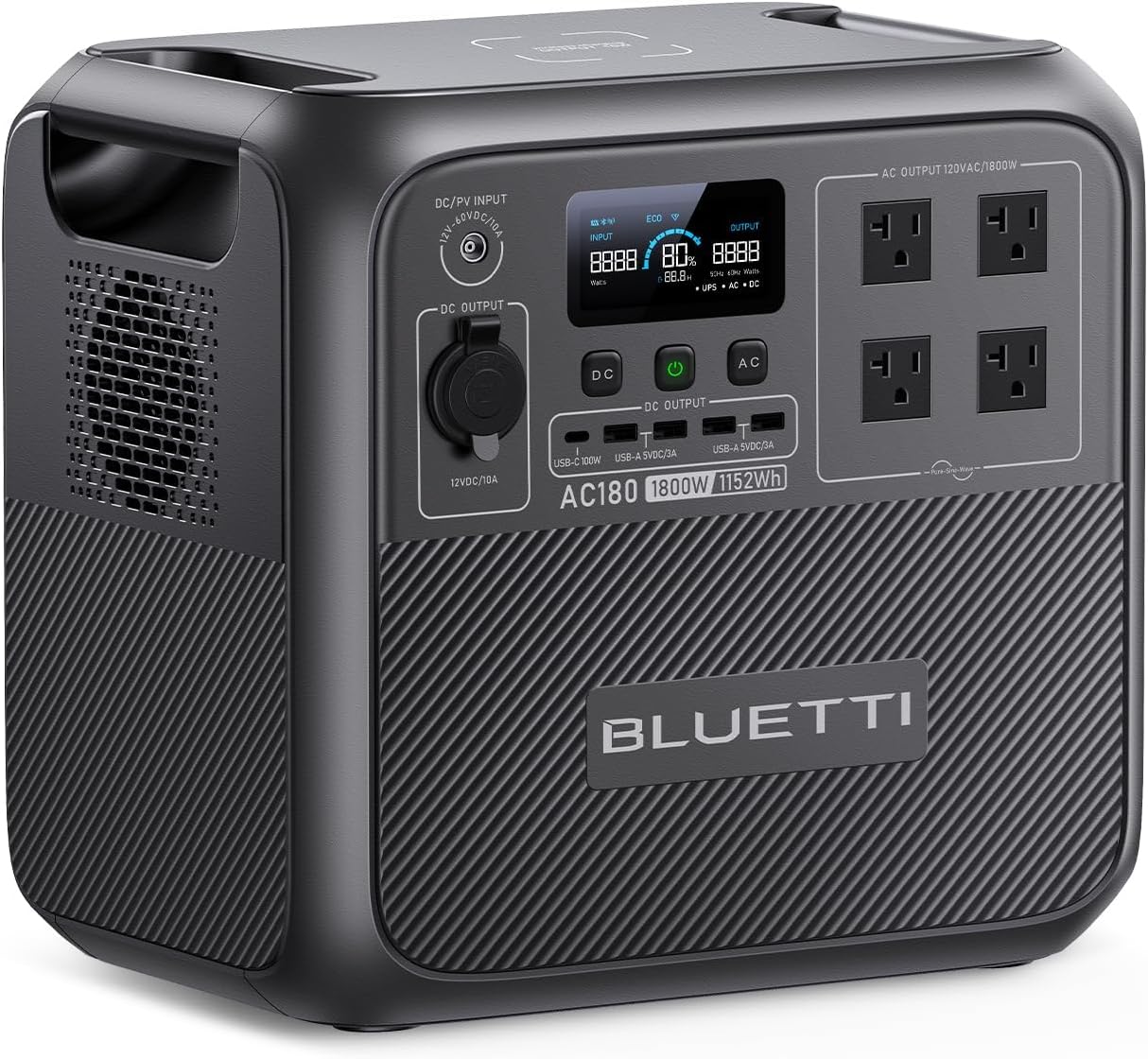
BLUETTI AC180 Portable Solar Generator
Check on Amazon
Key Specs:
- Wattage: 1800W output (2700W peak)
- Battery: 1152Wh LiFePO4
- Recharge Time: 1 hour (AC input)
- Solar Input: 500W for 2.8-3.3 hours full charge
- Weight: 35.3 pounds
The BLUETTI AC180 Portable Solar Generator offers exceptional power and fast charging capabilities, making it a perfect choice for off-grid living, camping, and emergency backup. With a 1152Wh LiFePO4 battery, it can be fully charged in just 1 hour via AC input at 1440W, ensuring it’s ready whenever you need it. The 1800W output and 11 outlets give you versatility, while the 500W solar input ensures it can be recharged quickly in 2.8-3.3 hours. It also doubles as a reliable UPS for home use.
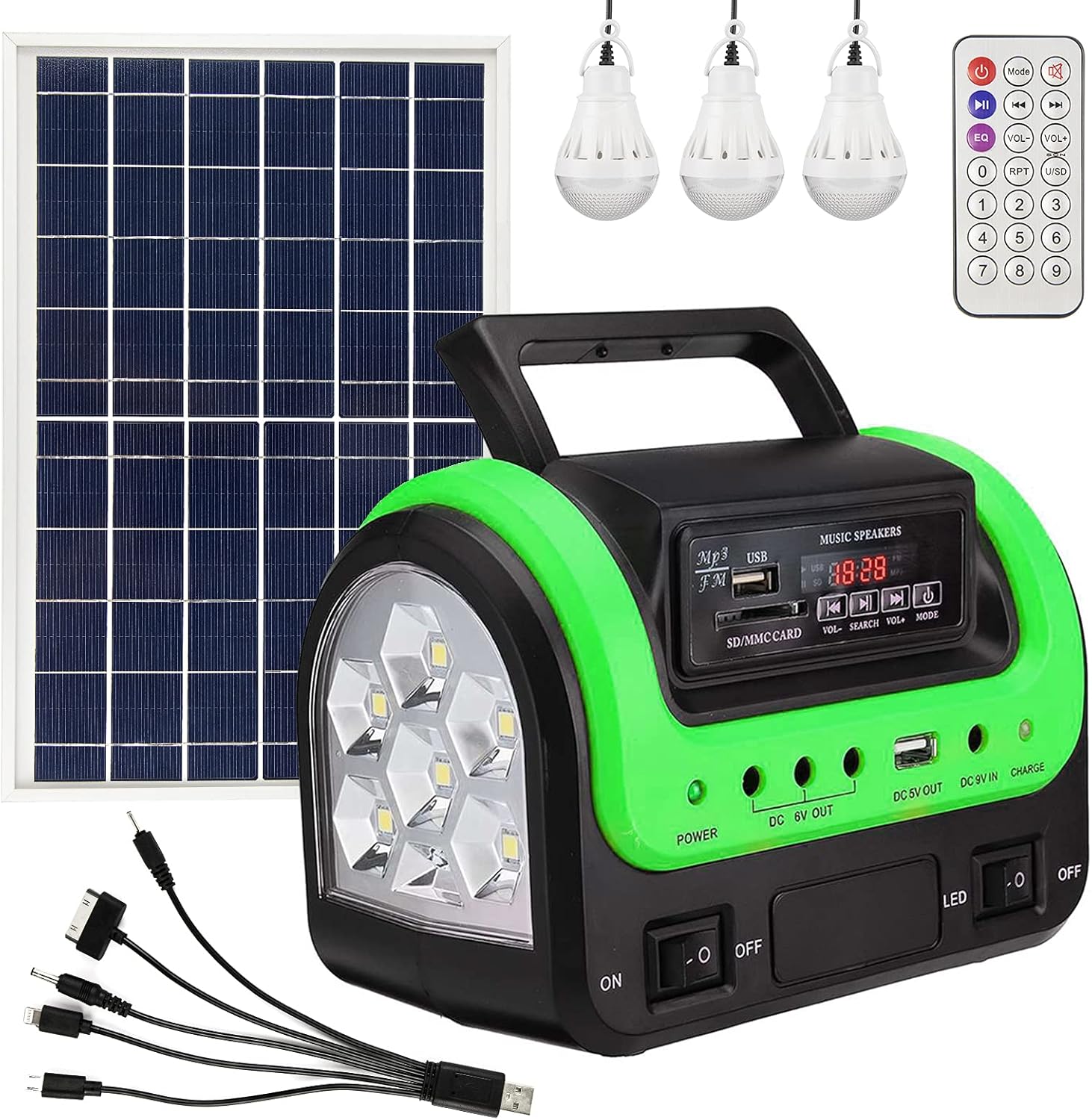
Upusa Solar Generator
Check on Amazon
Key Specs:
- Wattage: 5W
- Battery Power: High-quality battery, 3000+ cycles
- Charging Methods: Solar (5W) & AC
- Weight: 4 pounds
- Special Features: LED lights, DC/USB outlets, overload protection
The Upusa Solar Generator is a compact, lightweight, and versatile power solution for both home and outdoor use. This portable generator features a 5W solar panel, allowing it to recharge efficiently while providing power to LED lights, mobile phones, and other small devices. Equipped with built-in LED flashlights and 3 LED lamps, it offers excellent low-power lighting for emergency situations. With both solar and AC charging options, it’s perfect for camping or emergency backups. Plus, its battery lasts over 3000 cycles, making it a reliable long-term investment.
Importance of Reliable Energy Backup
In today’s interconnected world, reliable access to electricity is more than just a convenience; it’s a necessity. From powering essential appliances to keeping our devices connected, electricity plays a vital role in our daily lives. However, power outages can occur at any time, often without warning, disrupting our routines and potentially causing significant inconvenience and even danger.
Having a reliable energy backup is therefore crucial. It ensures that we can continue to function even during power outages, providing peace of mind and security. Solar generators, with their ability to provide clean, renewable power, are an excellent choice for this purpose.
Moreover, as the effects of climate change continue to intensify, the frequency and severity of extreme weather events are expected to increase, potentially leading to more frequent and prolonged power outages. In such a scenario, having a reliable energy backup like a solar generator becomes even more important.
Understanding Solar Generators
Definition of a Solar Generator
A solar generator is a device that converts sunlight into electricity. It does this through a process known as photovoltaics. Essentially, a solar generator consists of solar panels, a battery, a charge controller, and an inverter. The solar panels capture sunlight and convert it into direct current (DC) electricity. This electricity is then stored in the battery for later use.
The charge controller regulates the flow of electricity from the solar panels to the battery, preventing overcharging and ensuring the battery’s longevity. The inverter, on the other hand, converts the DC electricity stored in the battery into alternating current (AC) electricity, which is the type of electricity used by most household appliances.
It’s important to note that while the term “solar generator” is commonly used, it can be somewhat misleading. Unlike traditional generators that generate electricity through combustion, solar generators don’t actually generate electricity; they simply convert and store it.
How Solar Generators Work
The operation of a solar generator is relatively straightforward. When sunlight hits the solar panels, it excites the electrons in the panels’ solar cells, creating an electric current. This current is then directed to the charge controller, which regulates the flow of electricity to the battery.
The battery stores this electricity until it’s needed. When you plug an appliance or device into the solar generator, the stored electricity is converted from DC to AC by the inverter, allowing the appliance or device to use it. As long as there’s sunlight, the solar generator can continue to capture, convert, and store electricity.
One of the key advantages of solar generators is their ability to provide power during power outages. Unlike grid-tied solar systems, which shut down during power outages for safety reasons, solar generators can continue to provide power since they operate independently of the grid.
Benefits of Using Solar Generators
There are numerous benefits to using solar generators. First and foremost, they provide a source of clean, renewable energy. Unlike fossil fuel-based generators, solar generators produce no harmful emissions, making them a more environmentally friendly choice. They also contribute to energy independence, reducing reliance on the grid and fossil fuels.
Solar generators are also quiet, making them a more pleasant alternative to noisy, traditional generators. This makes them ideal for use in residential areas, where noise pollution can be a concern. Additionally, solar generators require less maintenance than their fossil fuel counterparts, saving time and effort in the long run.
Finally, solar generators can provide power indefinitely as long as they have access to sunlight. This makes them a reliable source of power during emergencies, such as power outages caused by extreme weather events. They can also be used in remote locations where access to the grid is not available, making them a versatile power solution.
Why Choose Solar Generators for Energy Backup
Environmental Benefits
One of the main reasons to choose solar generators for energy backup is their environmental benefits. Solar generators produce clean, renewable energy, reducing reliance on fossil fuels and helping to combat climate change. Unlike traditional generators, they produce no harmful emissions, making them a more environmentally friendly choice.
By choosing a solar generator, you’re not only ensuring a reliable source of power during outages; you’re also making a positive contribution to the environment. This is particularly important in today’s world, where the effects of climate change are becoming increasingly apparent.
Moreover, solar energy is abundant and inexhaustible. The sun provides more energy in an hour than the entire world uses in a year. By harnessing this energy, solar generators provide a sustainable power solution that can help to ensure a cleaner, greener future for all.
Cost-effectiveness
Another reason to choose solar generators for energy backup is their cost-effectiveness. While the upfront cost of a solar generator can be higher than that of a traditional generator, the ongoing costs are significantly lower. Solar generators require less maintenance, saving time and money in the long run.
Moreover, the cost of solar power has been decreasing steadily over the years, making it an increasingly affordable option. In many cases, the cost of a solar generator can be recouped over time through savings on electricity bills. This makes solar generators not only an environmentally friendly choice, but also a financially smart one.
It’s also worth noting that in many regions, there are incentives available for installing solar power systems, such as tax credits and rebates. These can help to offset the upfront cost of a solar generator, making it an even more cost-effective choice.
Dependability During Power Outages
Perhaps the most compelling reason to choose a solar generator for energy backup is its dependability during power outages. Unlike grid-tied solar systems, which shut down during power outages for safety reasons, solar generators can continue to provide power since they operate independently of the grid.
This can be a lifesaver during emergencies, such as power outages caused by extreme weather events. With a solar generator, you can keep your essential appliances running, stay connected, and maintain a sense of normalcy even during a power outage.
Moreover, as the effects of climate change continue to intensify, the frequency and severity of extreme weather events are expected to increase, potentially leading to more frequent and prolonged power outages. In such a scenario, having a reliable energy backup like a solar generator becomes even more important.
Factors to Consider When Buying a Solar Generator
Power Output
One of the key factors to consider when buying a solar generator is its power output. This is typically measured in watts and determines how many appliances or devices the generator can power at once. The power output you need will depend on your specific needs and the appliances or devices you plan to power.
For example, if you plan to use the generator to power essential appliances during a power outage, you’ll need to calculate the total wattage of these appliances and choose a generator with a power output that can accommodate this. Keep in mind that some appliances, such as refrigerators and air conditioners, require more power to start up than to run, so you’ll need to factor this into your calculations.
It’s also worth noting that the power output of a solar generator can vary depending on the amount of sunlight available. On cloudy days, the generator may produce less power. Therefore, it’s a good idea to choose a generator with a power output that can meet your needs even under less-than-ideal conditions.
Battery Capacity
Another important factor to consider when buying a solar generator is its battery capacity. This is typically measured in watt-hours and determines how long the generator can provide power without sunlight. The battery capacity you need will depend on your specific needs and how long you expect to use the generator without sunlight.
For example, if you plan to use the generator for camping trips, you’ll need a battery capacity that can provide power for the duration of your trip. If you plan to use the generator for emergency backup power during power outages, you’ll need a battery capacity that can provide power for the duration of the outage.
Keep in mind that the battery capacity of a solar generator can be depleted faster if you’re using it to power high-wattage appliances or devices. Therefore, it’s a good idea to choose a generator with a battery capacity that can meet your needs even under heavy usage.
Size and Portability
The size and portability of a solar generator are also important factors to consider. If you plan to use the generator for camping trips or other outdoor activities, you’ll need a generator that’s compact and easy to transport. On the other hand, if you plan to use the generator for emergency backup power at home, size and portability may be less of a concern.
Keep in mind that the size of a solar generator is often related to its power output and battery capacity. Larger generators typically have higher power outputs and larger battery capacities, while smaller generators have lower power outputs and smaller battery capacities. Therefore, you’ll need to balance your need for power and battery capacity with your need for portability.
It’s also worth considering the weight of the generator. Some solar generators can be quite heavy, making them difficult to transport. Look for a generator with a manageable weight, especially if you plan to move it frequently.
Price
Price is always a key factor to consider when buying any product, and solar generators are no exception. The price of a solar generator can vary widely depending on its power output, battery capacity, size, and other features. Therefore, it’s important to set a budget before you start shopping and stick to it.
Keep in mind that while the upfront cost of a solar generator can be higher than that of a traditional generator, the ongoing costs are typically lower. Solar generators require less maintenance and can provide power indefinitely as long as they have access to sunlight, potentially saving you money in the long run.
It’s also worth noting that in many regions, there are incentives available for installing solar power systems, such as tax credits and rebates. These can help to offset the upfront cost of a solar generator, making it an even more cost-effective choice.
Warranty and Customer Support
Finally, consider the warranty and customer support offered by the manufacturer. A good warranty can provide peace of mind, protecting your investment in case of defects or malfunctions. Look for a manufacturer that offers a long, comprehensive warranty.
Customer support is also important. If you have any issues with your solar generator, you’ll want to be able to reach out to the manufacturer for assistance. Look for a manufacturer that offers good customer support, with multiple ways to get in touch and responsive, helpful representatives.
Top Solar Generators in the Market
Brief Overview of Top-Rated Solar Generators
There are many solar generators available on the market, each with its own features and specifications. Some of the top-rated solar generators include the Goal Zero Yeti 400, the Jackery Explorer 500, and the EcoFlow Delta 1300.
The Goal Zero Yeti 400 is a compact, portable solar generator with a power output of 400 watts and a battery capacity of 396 watt-hours. It’s ideal for camping trips and other outdoor activities, as well as for emergency backup power at home.
The Jackery Explorer 500 is a versatile solar generator with a power output of 500 watts and a battery capacity of 518 watt-hours. It features multiple output ports, including AC, DC, and USB, allowing you to power a variety of appliances and devices.
The EcoFlow Delta 1300 is a powerful solar generator with a power output of 1800 watts and a battery capacity of 1260 watt-hours. It’s capable of powering multiple appliances at once, making it ideal for emergency backup power during power outages.
Features and Specifications
When comparing solar generators, it’s important to consider their features and specifications. These can include the power output, battery capacity, size, weight, number and type of output ports, charging options, and more.
The Goal Zero Yeti 400, for example, features two AC outlets, two USB ports, and three 12V ports, offering plenty of options for powering your appliances and devices. It can be charged via solar panels, an AC wall outlet, or a 12V car outlet, providing flexibility in how you charge it.
The Jackery Explorer 500, on the other hand, features three USB ports, one AC outlet, and one 12V car outlet. It also includes a built-in LED flashlight, making it a handy tool for camping trips and other outdoor activities.
The EcoFlow Delta 1300 features six AC outlets, four USB ports, and two USB-C ports, allowing you to power multiple appliances and devices at once. It also boasts a fast recharge time, capable of recharging from 0% to 80% in just one hour when plugged into an AC wall outlet.
Pros and Cons
Each solar generator has its own pros and cons. The Goal Zero Yeti 400, for example, is praised for its compact size and portability, but some users note that its battery capacity is somewhat limited. The Jackery Explorer 500 is lauded for its versatility and built-in flashlight, but some users find its power output to be insufficient for larger appliances.
The EcoFlow Delta 1300 is commended for its high power output and fast recharge time, but some users note that it’s heavier and bulkier than other models. It’s important to consider these pros and cons when choosing a solar generator, as they can help you determine which model is the best fit for your needs.
How to Properly Maintain a Solar Generator
Regular Cleaning and Inspection
Proper maintenance is key to ensuring the longevity and performance of your solar generator. Regular cleaning and inspection are essential. Dust and dirt can accumulate on the solar panels, reducing their efficiency. Therefore, it’s important to clean the panels regularly with a soft cloth and mild detergent.
Regular inspection is also important. Check the solar panels for any signs of damage, such as cracks or chips. Check the battery for any signs of swelling or leakage. Check the cables and connections for any signs of wear or corrosion. If you notice any issues, contact the manufacturer or a qualified technician for assistance.
Battery Care and Replacement
The battery is one of the most critical components of a solar generator, and proper care is essential to ensure its longevity. Avoid overcharging the battery, as this can shorten its lifespan. Most solar generators feature a charge controller that prevents overcharging, but it’s still a good idea to monitor the charging process.
Also, avoid depleting the battery completely, as this can also shorten its lifespan. Try to keep the battery at least partially charged at all times. If the battery needs to be replaced, be sure to choose a replacement battery that’s compatible with your solar generator. Always follow the manufacturer’s instructions for battery replacement.
Safe Storage and Handling
Safe storage and handling are also important for maintaining your solar generator. Store the generator in a cool, dry place out of direct sunlight. Avoid exposing the generator to extreme temperatures, as this can damage the battery and other components.
When handling the generator, be careful not to drop it or subject it to strong impacts, as this can damage the solar panels and other components. Also, avoid exposing the generator to water or other liquids, as this can cause electrical shorts and other damage.
Conclusion
Recap of the Importance of Solar Generators as a Reliable Energy Backup
In conclusion, solar generators are an excellent choice for a reliable energy backup. They provide clean, renewable power, reducing reliance on fossil fuels and helping to combat climate change. They are also cost-effective, requiring less maintenance and providing power indefinitely as long as they have access to sunlight.
Solar generators are also dependable during power outages, providing a source of power when the grid is down. They are versatile, suitable for a variety of applications, from powering homes and businesses to providing power for camping trips and other outdoor activities.
With the increasing frequency and severity of extreme weather events due to climate change, having a reliable energy backup like a solar generator is more important than ever. By choosing a solar generator, you’re not only ensuring a reliable source of power; you’re also making a positive contribution to the environment.
Final Thoughts on Choosing the Right Solar Generator
Choosing the right solar generator requires careful consideration of several factors, including power output, battery capacity, size, portability, price, and warranty. It’s important to choose a generator that meets your specific needs and fits within your budget.
There are many excellent solar generators available on the market, each with its own features and specifications. By doing your research and comparing different models, you can find the solar generator that’s the perfect fit for you.
Remember, a solar generator is an investment in your future. By choosing a solar generator, you’re investing in a cleaner, greener future for all.
FAQ
What is a solar generator?
A solar generator is a device that converts sunlight into electricity. It consists of solar panels, a battery, a charge controller, and an inverter. The solar panels capture sunlight and convert it into electricity, which is then stored in the battery for later use.
How does a solar generator work?
A solar generator works by capturing sunlight with its solar panels and converting it into electricity. This electricity is then stored in the battery for later use. When you plug an appliance or device into the solar generator, the stored electricity is converted into the type of electricity the appliance or device can use.
What are the benefits of using a solar generator?
Solar generators offer several benefits. They provide a source of clean, renewable energy, reducing reliance on fossil fuels and helping to combat climate change. They are also quiet, require less maintenance, and can provide power indefinitely as long as they have access to sunlight.
What factors should I consider when buying a solar generator?
When buying a solar generator, consider factors such as power output, battery capacity, size, portability, price, and warranty. It’s important to choose a generator that meets your specific needs and fits within your budget.
How do I maintain a solar generator?
Maintain a solar generator by cleaning and inspecting it regularly, taking care of the battery, and storing and handling it safely. Regular cleaning and inspection can help to ensure the generator’s efficiency and longevity. Proper battery care can extend the battery’s lifespan, and safe storage and handling can prevent damage to the generator.
